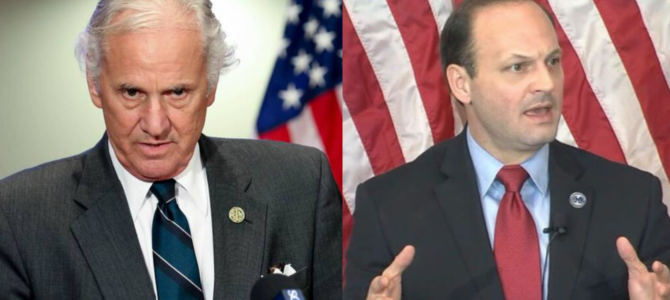South Carolina Governor Henry McMaster and Attorney General Alan Wilson have drawn criticism from Democratic officials due to conflicting interpretations of a budget proviso.
After the University of South Carolina announced that masks would be required in all campus buildings, McMaster and Wilson claimed the move to be against the law. They referenced a budget proviso that prohibits South Carolina’s public schools and universities from using state funds to enforce mask mandates, even as health officials are seeing more children hospitalized with COVID-19 related illnesses.
Representative Leon Stavrinakis is one of many Democratic officials who have criticized the proviso. Calling the legislation “dumb [and] reckless,” he clarified that the proviso does not ban mask mandates in schools — rather, it bans the use of state funding to enforce masking in schools.
Stavrinakis argued that public school districts have “clear legal authority…to regulate conduct in their schools” and may utilize local funds however they would like, including to require masks in schools.
Representative Annie McDaniel has also raised doubts regarding the top Republicans’ legal interpretation of the proviso. In a letter sent to the Attorney General, McDaniel requested his opinion on the phrase “appropriated funds.”
“The text is a little vague,” McDaniel stated. Her letter calls for Wilson to clarify whether other sources of funding, like county taxes or federal appropriations, could be used to enforce mask mandates in public schools. Wilson has yet to respond to the letter.
If we’re attempting to understand the legislature’s intent in passing the budget proviso, why not refer to the words of the author himself? In an op-ed for The Post and Courier, editorial writer Cindi Ross Scoppe examines the words of Representative Stewart Jones who authored the budget amendment.
During the legislature’s debate, Jones described to his colleagues that the amendment “prohibits state funds from being used for COVID-19 passports at our higher-learning facilities, any state-funded college.” As Scoppe points out, he never even says the word “mask.”
Scoppe explains that legislative intent can be determined through reviewing the official legislative record, such as the debate regarding the amendment. “You can’t use what legislators say today to determine what the Legislature meant yesterday,” she writes.
In examining the legislature’s debate of the proviso, Scoppe demonstrates how McMaster and Wilson are attempting to revise history. Democrats are right: the legislature never intended for the proviso to ban mask mandates in the first place.
Governor McMaster and Alan Wilson have irresponsibly twisted the proviso into something it’s not. Mask mandates are not an attack on anyone’s personal liberty, but it does make for a good talking point as the 2022 elections draw near.
With lives literally at stake, McMaster and Wilson should do the right thing and allow public schools and universities to enforce mask mandates. If protecting South Carolinians and their children proves to be too difficult for the duo, then the courts must intervene and voters must reconsider their support next election cycle.


